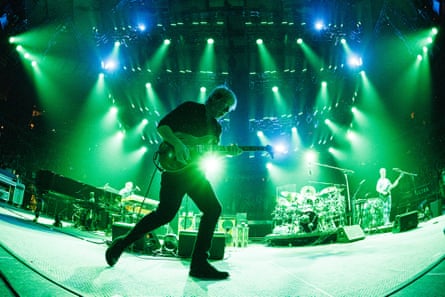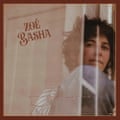Phish have long been something of a unicorn in the fabric of popular music. Operating largely outside the traditional framework of the industry, the Vermont four-piece has become one of the world’s highest-grossing touring acts without a single mainstream hit or a platinum-selling album, consistently selling out stadiums and amphitheaters across the United States for decades. Their extraordinary commercial success, built almost entirely on the strength of their live performances and anything-can-happen ethos, stands as a testament to the loyalty and dedication of their fanbase.
While they have played outside the US sparingly over the years – a couple of tours of Europe and Japan, even warming up the Pyramid Stage for that Prodigy set at Glastonbury – Phish remain a uniquely American phenomenon. Nowhere is that more palpable than at Madison Square Garden, which has become hallowed ground for the band and their itinerant fans. Since their apotheotic first New Year’s Eve outing there in 1995, through the Baker’s Dozen series in 2017 – a 13-night elaborately themed residency featuring 237 songs with no repeats – their multi-night runs at the midtown Manhattan landmark have become a cherished ritual for their dedicated community. On Tuesday night, the band returned to their spiritual home ground for the fourth show of a four-night New Year’s Eve run (and 87th date at MSG overall), delivering a marathon performance over three sprawling sets that underscored why they remain the standard-bearers of improvisational rock more than 40 years into their career.
Entering the arena feels less like attending a typical rock concert and more like stepping into a temporary autonomous zone of joy and spontaneity. Fans in tie-dyed shirts and glittering New Year’s Eve regalia lined the concourses, many clutching limited-edition posters or comparing notes on the previous three evenings. Phish fandom thrives on the unpredictable – the setlist changes every night and fans know they’ll never hear the same show twice – and the crowd buzzed with speculation about what songs might emerge. The conceit owes untold debts to the Grateful Dead, but Phish’s own longevity since their 1983 formation at the University of Vermont has seen them create their own lane and sustain their success across generations of fans.
The night began with a first set that leaned into the band’s ability to balance tightly composed classics with freewheeling jams. Opening with Mike’s Song into Bouncing Around the Room and Weekapaug Groove, the players immediately locked into a groove around the lead guitar of Trey Anastasio, the band’s endlessly smiling guitarist and de facto frontman, who turned 60 in September. Stash featured a snippet of the Allman Brothers’ In Memory of Elizabeth Reed, drawing roars from the knowing crowd. Split Open and Melt brought the first extended improvisational deep dive of the night, a 13-minute exploration that blurred the lines between dissonance and catharsis. Closing with the emotive The Squirming Coil, with Page McConnell’s delicate piano solo leaving the crowd in hushed awe, the bar was set high for the rest of the evening.

The second set showcased Phish’s mastery of dynamics, opening with Sigma Oasis, a buoyant anthem of optimism, before transitioning into a sinister My Friend, My Friend. The centerpiece was a seamless run through a cover of TV on the Radio’s song Golden Age, the hauntingly minimalist What’s the Use?, and the intricate interplay of Taste, where Jon Fishman’s drumbeats locked tightly with Mike Gordon’s basslines, and McConnell’s twinkling piano flourishes added color to Anastasio’s spiraling solos. The closing sequence of the 80s-era favorite Golgi Apparatus and the rollicking First Tube were pure arena rock, capping off a near flawless hour of music that balanced introspection with unrestrained energy.
But it was the third set where Phish truly demonstrated why their New Year’s Eve shows have become the stuff of legend. Emerging in matching blue jumpsuits – with the drummer in his customary doughnut-patterned muumuu – the band signaled that the midnight gag, a tradition fans eagerly anticipate each year, was about to unfold. The set opened with Character Zero before the band debuted the new song Pillow Jets. As the music built, the visual spectacle took center stage: glowing coils that had hovered above the crowd all night began to descend, accompanied by screens displaying surreal, kaleidoscopic imagery. A fractured face sculpture slowly lowered from the ceiling, while dancers in flowing yellow robes, dubbed “conjurors of thunder”, performed an otherworldly choreography.
As the countdown to midnight reached its climax, the face came together, the dancers shed their robes to reveal glowing, rave-ready accessories, and the band launched into a euphoric rendition of Auld Lang Syne as the confetti fell. From there, the set exploded into What’s Going Through Your Mind, which incorporated elements of EDM – a rarity for Phish – threading in bits of songs like Blaze On, Martian Monster and The Lizards. The marriage of Gordon’s edifice-shaking bass bombs with Anastasio’s towering melodic riffs in Slave to the Traffic Light, enhanced by the lighting director Chris Kuroda’s expert work on one of the most complex rigs in the business, lifted the crowd to a state of grace. After a barbershop quartet-style rendition of Grind to start the encore, Phish closed with Tweezer Reprise, a reliable barnburner that sent the crowd into a frenzy. Its anthemic riff, repeated and amplified, dropped the curtain on four nights of musical virtuosity, absurdist theatre and pure communal joy at 1am sharp.
From cultivating a secret language through call-and-response moments, embracing glowstick wars and other spontaneous phenomena, to playing chess with the crowd over an entire tour, Phish have continuously redefined what it means to connect with an audience. In what’s becoming a long life of seeing live music, the only other place I’ve witnessed the same level of fan devotion – unbridled excitement, deep audience participation, fans seemingly having out-of-body experiences wherever you look – was on the Eras Tour. And as with Taylor, that it’s not for everyone goes without saying. Todd Phillips’ excellent 2000 documentary on the band features a scene where Anastasio confronts a negative review from Entertainment Weekly: “Phish could urinate in its fans’ ears and tell them it’s music. The fans in turn would be there with tape recorders to capture the moment.” Then and now, there’s not a bigger YMMV proposition in pop music. For the uninitiated, the byzantine compositions and endless jams, inside jokes and ocean-deep lore can seem impenetrable, but for those in the know, it’s a journey like no other.
The night was a culmination of a busy 2024 for the group. Their four-night run at the Vegas Sphere in April, which drew rare mainstream attention and widespread critical acclaim, was one of the hottest tickets of the year. They released their 16th studio album, Evolve, doing NPR’s Tiny Desk and the late-night circuit they normally bypass. A 26-date summer tour was one of the year’s highest-grossing and their four-day camping festival, their 11th, drew roughly 50,000 fans to a Nascar track in coastal Delaware. But there’s no place quite like home – and Tuesday’s victory lap inside their friendliest confines managed to build on their rich tradition of turning the year’s final hours into something transcendent.
Source: theguardian.com


